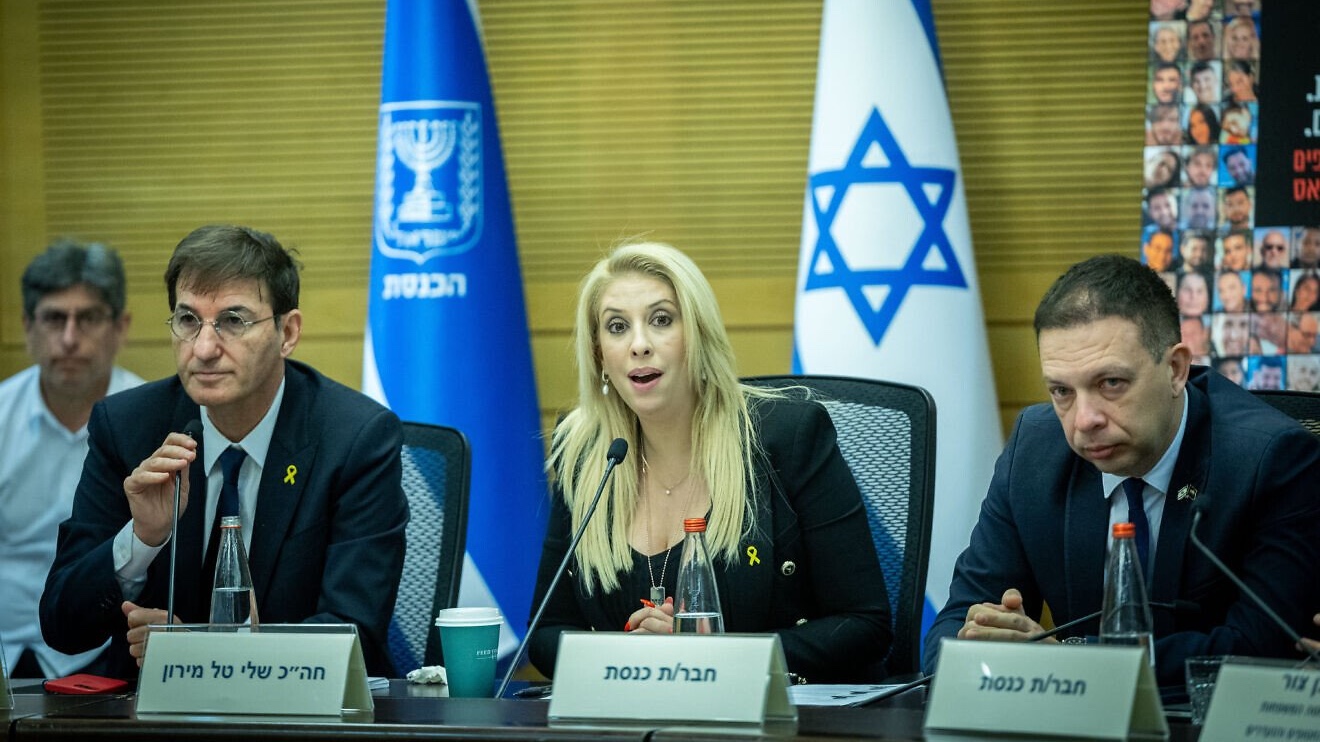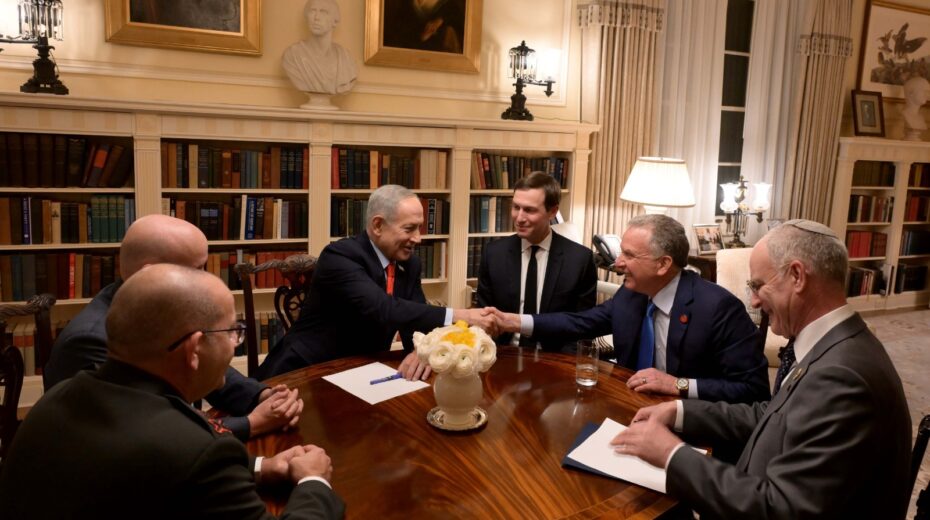(JNS) As Israel enters an election year (a vote must be held by Oct. 27, 2026), Yesh Atid lawmaker Shelly Tal Meron, discussed her vision for the future of the Gaza Strip, her service in the air force, and her work centered on the hostage issue and Hamas’s Oct. 7, 2023, sexual violence.
Tal Meron, chair of the Knesset Caucus for Female Victims of Sexual and Gender Violence in the Swords of Iron War, traveled to parliaments, met with ministers, heads of state, committee leaders and journalists to raise awareness of the issue.
“At first, the world talked about Oct. 7 and the hostages—but soon the narrative shifted to Gaza, and almost no one spoke about the sexual assaults,” she told JNS on Wednesday.
Shortly after the attacks, Tal Meron sent a letter—co-signed by female Knesset members—to human rights and women’s organizations worldwide, urging them to condemn Hamas’s use of sexual violence as a weapon of war on Oct. 7 and on captives.
“It had nothing to do with politics,” she emphasized. “We sent around 100 letters across the world—and no one responded. The issue became very close to my heart. I felt someone had to be the voice of these women. Most were murdered after being sexually assaulted, but some survived. There were also witnesses and hostages brave enough to come forward.
“During the first year, many mothers and young children were released, but the five young IDFsurveillance soldiers remained in captivity for a very long time. We were deeply concerned they might return pregnant,” she said.
Tal Meron joined opposition leader and Yesh Atid Party head Yair Lapid in his international meetings, speaking with foreign ministers and officials around the world.
“Almost everyone I met asked me about humanitarian aid and the situation in Gaza,” she recalled. “I always replied that, while I don’t want anyone to starve, what about the human rights of our hostages? Where are the humanitarian aid and medical care for them?”
In Paris, she met with Aurore Bergé, France’s minister for gender equality, and together they founded the Global Women’s Coalition Against Gender-Based Violence as a Weapon of War.
“I told her that sexual assault used as a weapon of war is a national security issue—it’s sexual terror, and that’s how we must view it,” Tal Meron said. “It’s not just an Israeli problem; it’s lurking around the corner in other countries. In France, for instance, a 12-year-old girl was raped as revenge for Gaza.”
The coalition’s first convention was held at the Knesset in 2024, and the second took place this month at the French Senate.
“We’re working on two fronts: to promote local legislation in national parliaments and to address this issue internationally in global courts,” Tal Meron explained. “The Geneva Conventions date back to 1949—this is a different era, and we need to update the legal framework.”
The air force proved
A former captain in the Israeli Air Force, Tal Meron reflected on the immense challenges faced by the force on Oct. 7, when it was called to confront an unprecedented threat from within Israel’s own borders.
“When you have to fire inside a kibbutz, the moral dilemma is enormous,” she told JNS. “You fear harming your own civilians while fighting terrorists—it makes decision-making extremely difficult.”
“Since Oct. 7, the army has achieved remarkable successes, particularly the air force,” she continued. “During my service, we trained for scenarios like the war with Iran. Many of my friends were involved, and I was incredibly proud of them. They did an outstanding job. There are still many challenges ahead, but the air force truly proved itself during this war.”
As chair of the Israel–UK Parliamentary Friendship Group, Tal Meron met with numerous British delegations and members of parliament, and testified before the House of Common’s Foreign Affairs Select Committee. She urged British lawmakers to adopt a firmer and more unequivocal stance against Hamas and to advocate for the release of Israeli hostages, similar to the approach taken by US President Donald Trump.
Tal Meron sharply criticized British Prime Minister Keir Starmer’s Sept. 21 decision to unilaterally recognize a Palestinian state, calling it a grave mistake.
“The timing was terrible,” she said. “Rewarding Hamas for committing a massacre on Oct. 7 by recognizing a Palestinian state is absurd. Beyond that, there’s no real infrastructure for such recognition.
“What is this state supposed to be? Who will govern the Gaza Strip?” she asked. “The Palestinian Authority is weakened and riddled with corruption, while Hamas continues to seize control of more territory. There’s no realistic way for the Palestinian Authority to take over Gaza and form a functioning state. This declaration was fundamentally wrong and, sadly, appears to have been driven by domestic political pressure in the UK”
Regarding the US president’s role in the war in Gaza and efforts to secure the hostages’ release, Tal Meron said she shared Lapid’s view that Trump deserves the Nobel Peace Prize for his contribution.
“I’m deeply thankful to the Trump administration for supporting Israel and for helping bring our hostages home,” she said. “Before this deal, Trump also secured the release of Edan Alexander, the last living American hostage. He was the only one who achieved that—he used the word ‘peace’ and created both this agreement and a vision for the future. He deserves the Nobel Prize, and I truly hope he receives it.”
Addressing Trump’s suggestion of resettling Gazans abroad, Tal Meron said she considered the idea unrealistic and now irrelevant. She also emphasized her opposition to reoccupying the Gaza Strip.
“Israel needs to rehabilitate itself,” she told JNS. “We have so many internal issues—strengthening our army, addressing the draft bill and helping over 120,000 Israelis evacuated from their homes. There are enough challenges within Israel; we don’t need to take on Gaza.”
An Egyptian plan
On the future of the Gaza Strip, Tal Meron said Yesh Atid had long proposed an “Egyptian plan,” even before the current government reached an agreement with Trump.
“I think the ‘day after’ should have been discussed on Oct. 8,” she said. “When you don’t form a strategic plan, someone else does it for you. The wave of recognition for a Palestinian state happened because this government failed to deal with the issue. Our proposal was for Egypt to take temporary control of Gaza—about 15 years—in exchange for international debt relief. Egypt knows the territory, understands how to deal with the Muslim Brotherhood, and could cooperate with moderate Arab states and Western allies.
“I’m not sure what will happen because things remain unstable, but we do need international forces involved in Gaza’s ‘day after,’” she continued. “The Palestinian Authority could participate in civil administration, but it’s not capable of taking full control.”
Tal Meron said the Trump plan “is a good one,” but warned that Hamas’s noncompliance undermines its implementation. “They were supposed to release all of our deceased hostages, yet four [since Thursday night, three—A.B.] remain in captivity. During the ceasefire, four Israeli soldiers were also killed. You can’t trust Hamas—but we need to keep trying to make this plan work,” she said.
Still, she stressed, Israel’s national security must remain in Israeli hands. “Yes, we have partners and allies, but no one else should decide what happens in Israel. We need to be firm about Gaza’s future. Having Turkish forces on the ground there would not serve Israel’s interests.”
As elections approach, Tal Meron noted that there is ongoing coordination among opposition party leaders.
“The media focuses on the fact that they’re not taking photos together,” she said. “But what matters is substance—and in substance, they meet regularly and share a mutual goal: doing what’s best for the State of Israel.
“Everyone understands what’s at stake—this is the most crucial election in Israel’s history,” she added. “It’s clear that [former Prime Minister] Naftali Bennett is returning to politics. He’s a future partner of ours, as he was in the previous government. Talks and understandings are already underway.”
Want more news from Israel?
Click Here to sign up for our FREE daily email updates














